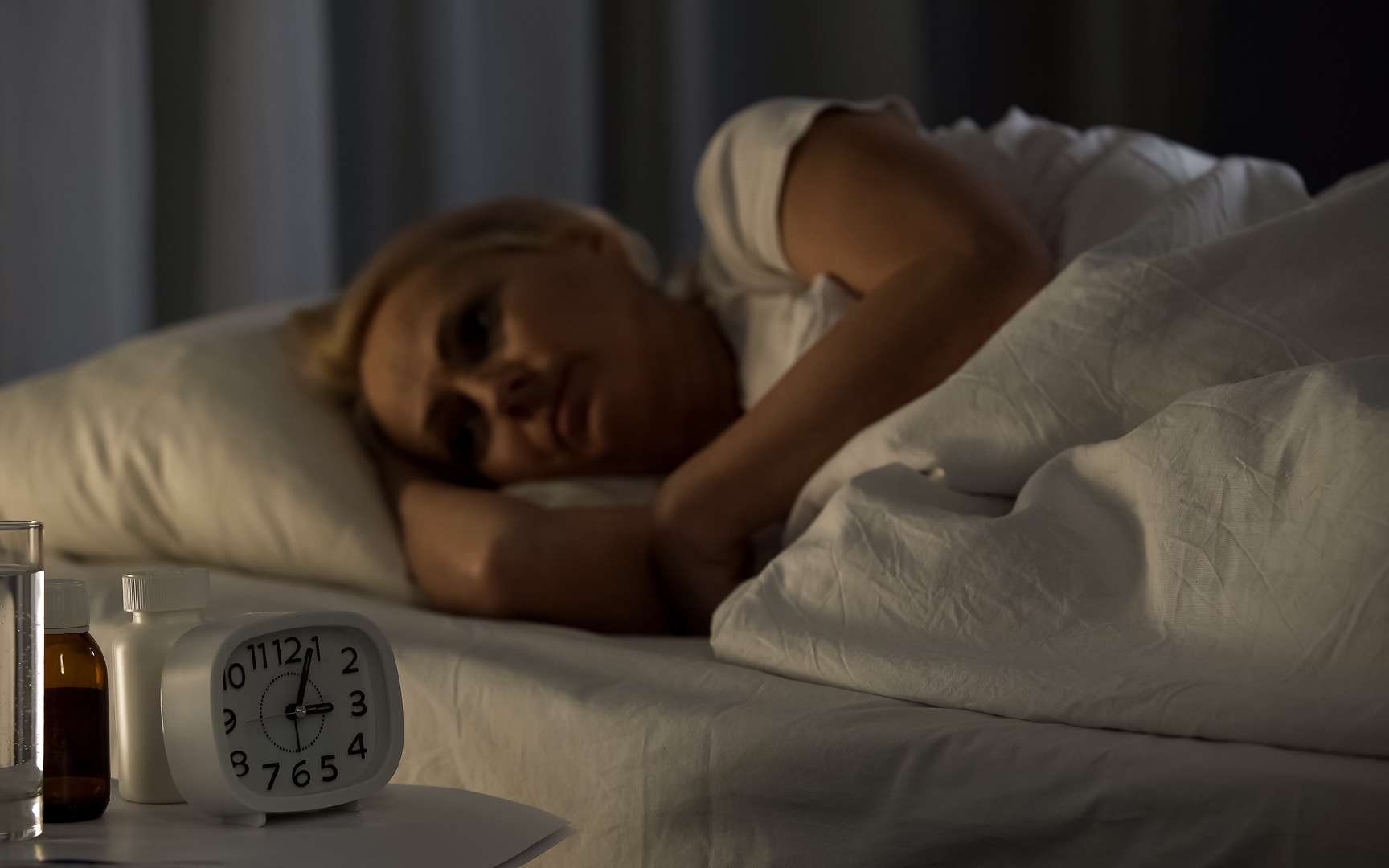The older we get, the worse the quality of our sleep becomes. The proof: almost one in three senior citizens suffer from insomnia and night-time awakenings. This has a negative impact on the quality of life and health of those affected.
The duration, timing and depth of sleep change, stability decreases and REM sleep gives way more quickly to light sleep… These changes can be accompanied by sleep disorders and require the implementation of adapted solutions.
It is important to understand these changes and the disorders that may occur in order to adopt the right measures for a more peaceful night’s sleep.
According to a study carried out by the American NSF – National Sleep Foundation – an elderly person needs 7 to 8 hours of sleep to avoid the risk of fatigue during the day. But with age, the rhythm of sleep changes: the night becomes fragmented, interrupted by several nocturnal awakenings, bedtime is earlier and consequently so is waking up, the time it takes to fall asleep is longer and the deep sleep phases are shorter.
It is therefore necessary to adopt the right reflexes: lifestyle and sleep hygiene rules, diagnosis of the disorders, treatment and support by professionals. However, it is important to stress that in the case of sleep disorders, the prescription of medication is not systematic. In fact, according to the HAS, more than half of the treatments are not indicated.
Sleep disorders
There are many factors that can cause this problem. Firstly, there is the environment. While as a child, teenager or adult, we do not care at all about the surrounding noise, the ambient temperature, the light or darkness of the room, we become more sensitive as we grow older.
But the lifestyle of the senior citizen will also have a significant impact on the quality of sleep. For example, heavy meals and lots of water are often detrimental to a good night’s sleep. The same applies to getting too excited or agitated before going to bed. In addition, strong emotions must be taken into account, not to mention stress.
At bedtime, we are confronted with ourselves, and for an elderly person this means being confronted with everything that has become difficult with age: loneliness, sadness, anxiety about waking up at night and not falling asleep. The security necessary for a restful sleep is lost, especially if the elderly person is dependent on others for mobility and is “forced” to stay in a bed from which he or she cannot get out alone.
The changes in the sleep cycle of an elderly person are as follows:
Difficulty sleeping: according to a study by the National Institute of Sleep and Vigilance, about 40% of people over 75 complain about their sleep and up to 30% of people over 65 are affected by excessive sleepiness during the day;
Reduction in the amount of sleep and deep sleep. With age, the number of hours of sleep required to be in good health is progressively reduced: 16 to 20 hours at birth compared to 8 hours in adults, whereas 8-7 hours per 24 hours seems to be the time required around the age of 70. The reduction is more significant for deep slow-wave and REM sleep, which gives way to lighter sleep and increases the feeling of fatigue during the day. Beware, however, that sleep duration varies greatly from one individual to another;
Increase in the time it takes to fall asleep. An elderly person takes longer to fall asleep, from less than 30 minutes before the age of 50 to more than 45 minutes from the age of 80;
Increased number of interruptions between sleep periods. An older person’s night is more fragmented with relatively frequent night-time awakenings and a feeling of lighter sleep. These interruptions within a cycle are accompanied by almost systematic awakenings at the end of each night. Moreover, the average duration of these interruptions also increases with age, up to one or more hours;
Earlier bedtime and earlier rising. With age, there is what is known as phase advance: the bedtime is earlier and as a result the elderly person wakes up earlier and has more difficulty sleeping in the morning;
Increased frequency of naps. For an elderly person, the need for sleep is distributed differently over a 24-hour cycle and the increase in the number of naps of varying lengths is often at the expense of night-time sleep. Nearly half of senior citizens take naps 3 to 6 times a week, depending on their age. 42% of senior citizens take a nap at the very beginning of the afternoon, for 28 minutes (the ideal duration of a nap recommended by specialists is 20 minutes). The need for a nap is a physiological need that exists from childhood onwards and returns with age. From the age of 50 onwards, the number of naps per week increases, ranging from 3 between the ages of 50 and 60 to 6 naps after the age of 80.
This return to napping is accompanied by a change in its duration; short in the 50-60 age group, it gradually lengthens to 1 hour or more after the age of 80, which can lead to difficulties in falling asleep. In fact, sleeping too much during the day “consumes” sleep during the following night and reduces the need for sleep at bedtime.
Snoring increases with age, especially in women after the menopause. This snoring can disturb the sleep of the snorer and his/her spouse, but for some patients, this snoring is associated with breathing pauses, which fragment sleep. If your snoring is accompanied by: breathing pauses, drowsiness during the day, memory problems, headaches on waking, the need to urinate more than twice a night, treatment-resistant arterial hypertension, heart problems. You should then look for sleep apnoea by carrying out tests such as a ventilation polygraph or polysomnography. Talk to your doctor about it, effective treatments exist that can improve your symptoms and your form during the day.
Sleep disorders sometimes linked to more serious problems
22% of seniors report sleep difficulties: insomnia (72% of them), staggered sleep schedules, sleep apnea syndrome or restless legs syndrome alter the quality of sleep of people who thus tend to fall asleep easily during the day. In addition to a state of drowsiness, which is confirmed in 65% of these seniors, memory loss is also observed.
Specialists note that an increase in sleep time among the elderly (more than 9 hours, and long naps) must be a sign of a possible alteration in memory functions. On the other hand, cause or consequence, sleep tends to be reduced (less than 6 to 7 hours) in the presence of associated pathologies, such as back and joint diseases, diabetes, arterial hypertension and heart disease, cancers, etc.
Yet for every individual, sleep is essential to maintain a good quality of life and to stay healthy. Indeed, it is at this time of the day that the body regenerates, the muscles rest, neuronal connections are created and organised, and memory is strengthened. At night the body also produces melatonin, a hormone that regulates the sleep cycle and is essential for maintaining good health.
When a person does not sleep properly or enough, it can lead to :
A decrease in immune defences and therefore a fragility against infections;
Fatigue, dizziness, loss of attention, concentration and memory problems, risk of falls, an increase in the number of domestic accidents and inappropriate use of medication.
Conversely, too much sleep leads to chronic fatigue and can cause various symptoms:
A feeling of being in a fog, persistent aches and pains, irritability, sleepiness.
In the long term, the risks increase and cardiovascular problems and dementia may appear. It is therefore essential to look for the associated cause to explain the disorders observed and to seek appropriate support.
Solutions to improve sleep patterns
On the whole, senior citizens spend 5 hours 19 minutes away from home per day during the week and 4 hours 24 minutes at the weekend. This period of time decreases with age and is accompanied by an increase in the duration of sleep over 24 hours, at the risk of causing a destructuring of the sleep rhythm. Indeed, 23.5% of older people suffering from insomnia go out for less than an hour, as do almost half of those over 80.
However, exposure to daylight helps regulate the internal biological clock, which correctly identifies the day-night alternation. Conversely, staying in the dark during the day leads to night-time sleep disorders and a state conducive to drowsiness.
Good bedding is therefore necessary, with a mattress adapted to the morphology of a senior. Invest in an orthopaedic model. In addition, the person should sleep in a quiet place in semi-darkness, far from the hubbub of the house, with a soft and pleasant temperature.
Neither too narrow nor too wide, the sleepwear should be comfortable so that the person feels at ease. If possible, set up a ritual before bedtime. And try to sleep and wake up at regular times. In the morning, air and light the room well so that the body can distinguish between day and night. Avoid activities that stimulate the senses in the early evening, and do not consume stimulants such as coffee, tea or alcohol in the afternoon.
Prefer small snacks and light meals. Afternoon naps are allowed as long as they are not prolonged. Infusions such as camomile and valerian can help you fall asleep easily. Finally, when your eyelids start to feel heavy, do not resist, but go straight to bed. If, after taking all these precautions, you still suffer from insomnia, it is advisable to consult a geriatrician.
The evening ritual is also important. It is advisable to plan relaxing activities in the evening, such as reading or listening to soft music. Screens should of course be avoided.
An airy room before bedtime, with a moderate temperature (18°C) during the night, is preferred.
Regularity of activity is also important. This allows the body to regulate its biological clock.
Many alternative medicines can be effective: sophrology, acupuncture, hypnosis…
Finally, if no improvement is noted after these adjustments, it is possible to call on a professional. He or she will be able to examine the causes of sleep disorders in greater depth and propose appropriate actions.
Bibliography:
David Bême, « Le sommeil des seniors », Doctissimo, 8 Octobre 2018. https://www.doctissimo.fr/html/psychologie/bien_dormir/articles/14289-sommeil-personnes-agees.htm
Institut amelis, « 10 conseils pour améliorer son sommeil quand on est senior », Institut Amelis, 10 Décembre 2021. https://institut.amelis-services.com/sante/les-bienfaits-du-sommeil-chez-la-personne-agee/
Le Mag du Senior, « Le sommeil chez les seniors », Ouest France avec Le Mag du Senior. https://lemagdusenior.ouest-france.fr/dossier-13-sommeil-seniors.html
OUIHELP, “Guide du sommeil pour les personnes âgées dépendantes », OUIHELP. https://www.ouihelp.fr/conseils/sante/le-sommeil-des-personnes-agees-guide-pour-passer-une-bonne-nuit/
Réseau Morphée, « Le sommeil des Seniors », Réseau Morphée, 2009. http://www.reseau-morphee.fr/wp-content/uploads/2009/11/brochure_sommeil_seniors_reseaumorphee.pdf


